Call for end to 'light touch' enforcement in wake of country's biggest ever fish kill

Salmon Watch Ireland said the fact that nobody has been held responsible for the loss of 32,000 fish illustrates the need for tougher enforcement and clearer response protocols. Photo: IFI/Facebook
The country's largest ever fish kill on the Blackwater River in Cork in August must become a wake-up call to end “light touch” environmental enforcement, Salmon Watch Ireland has said.
The body, which campaigns for the restoration of Ireland’s salmon populations, said the fact that nobody has been held responsible for the loss of 32,000 fish illustrates the need for tougher enforcement and clearer response protocols.











